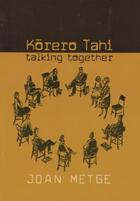-
Nombre de pages : (-)
-
Collection :
(-)
-
Genre :
(-)
-
Thème :
Non attribué
-
Prix littéraire(s) :
(-)
Résumé:
What it was like growing up in Maori rural communities in the mid-twentieth century? Voices from the past answer this question in the pages of this book. In te reo Maori, 'tauira' means both student and teacher. In the book Tauira, acclaimed educator and anthropologist Joan Metge introduces... Voir plus
What it was like growing up in Maori rural communities in the mid-twentieth century? Voices from the past answer this question in the pages of this book. In te reo Maori, 'tauira' means both student and teacher. In the book Tauira, acclaimed educator and anthropologist Joan Metge introduces readers to Maori methods of teaching and learning that are rich in lessons for us all. Based on extensive interviews, this book offers a window on a mid-twentieth-century rural Maori world as described by those who grew up there. Metge's work tackles important questions about Maori teaching and learning of this period: What was the role of whanau and hapu, household and marae, kaumatua and siblings, work and play? How much learning was practical and how much by teaching? Metge shows that Maori ways of learning flourished alongside the school system - especially in rural Northland, the Bay of Plenty and on the East Cape - and that those educational practices had a particular form and philosophy. Maori focused on learning by doing, teaching in context, learning in a group, memorising, and advancement when ready. Parents, grandparents and community leaders imparted cultural knowledge as well as practical skills to the younger generation through daily life and storytelling, in whanau and community activities. In preserving this evidence and these voices from the past, this important book also offers much inspiration for the future.
Donner votre avis















